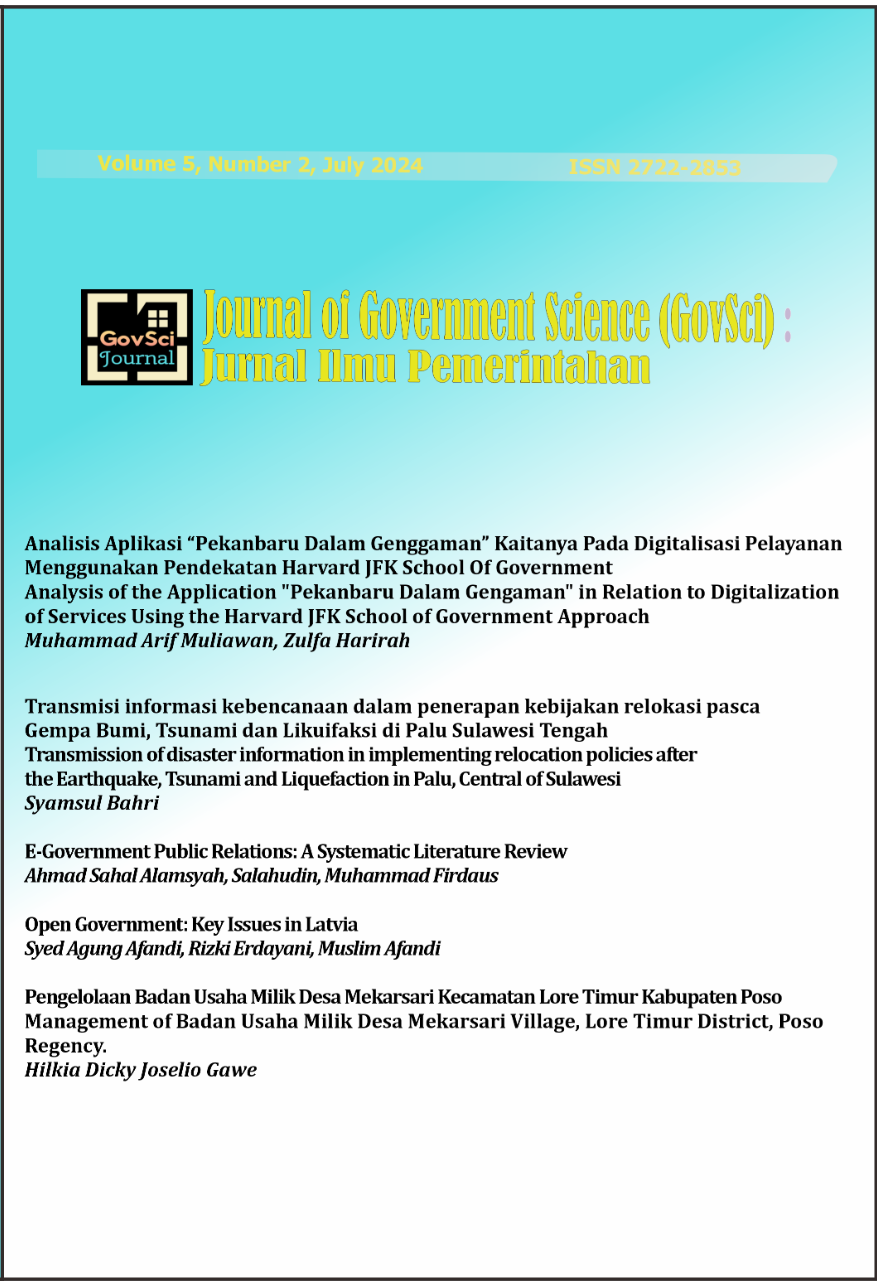Pengelolaan Badan Usaha Milik Desa Mekarsari Kecamatan Lore Timur Kabupaten Poso Management of Badan Usaha Milik Desa Mekarsari Village, Lore Timur District, Poso Regency
Abstract
This study aims to find out how the management of Sedana Mekar BUMDes applies the principles of village autonomy in Mekarsari village, East Lore sub-district, Poso district. This research was conducted in the village of Mekarsari, East Lore sub-district, Poso district with the theory of village autonomy put forward by Sutoro Eko (2014), which is Impunity and Initiative. The research method uses qualitative with descriptive research type. The technique of determining informants used a purposive sampling technique with 6 informants. Data collection techniques were carried out by means of observation, interviews and documentation. The results of this study concluded that the implementation of the principles of village autonomy in the management of BUMDes Sedana Mekar in Mekarsari village was considered not optimal. This is based on aspects of Sutoro Eko's theory used in this study, namely the principle of impunity and initiatives in the management of BUMDes Sedana Mekar. Inadequate planning often occurs in BUMDes management so that the initiatives implemented are not optimal. And it is also found that there are irregularities in the principle of impunity, namely the appointment of BUMDes administrators from village officials which causes the village oversight function of BUMDes to become village oversight of itself.
References
Alusi, F., & Sensuse, D. I. (2014). Penyusunan Strategi E-Government Berbasis Kerangka Kerja Pemeringkatan E-Government Indonesia (PEGI) Di Lembaga Penerbangan dan Antariksa Nasional. Journal of Information Systems, 10(1), 37–44.
Aptika, A. (2022). ASN Cakap Digital Pacu Optimalisasi Layanan Publik.
Bukit, B., Malusa, T., & Rahmat, A. (2017). Pengembangan Sumber Daya Manusia. In Zahir Publishing.
Estiningsih, H. M., & Hum, M. (2023). Indonesia Cakap Digital Melalui Kegiatan Literasi Digital Bagi Seluruh Aparatur Sipil Negara ( Asn ). Jurnal Pengabdian Masyarakat, 1(5), 695–704.
Faqih A, W. A. (2019). Strategi Pengembangan Sdm Dalam Persaingan Bisnis Industri Kreatif Di Era Digital. ’Adliya, 13(1), 115–126.
Fauzan, I. (2021). Transformasi Digital Audit Manajemen Aparatur Sipil Negara Dan Dampaknya Terhadap the Digital Transformation of Civil Servant Management Audit and Its Impact on Government. Civil Service, 15 (1), 37–50.
Indrajit, R. E. (2006). Elektronik Government: Strategi Pembangunan Dan Pengembangan Sistem Pelayanan Publik Berbasis Teknologi Digital. Penerbit Andi Yogyakarta.
Indrayani, E. (2016). E-Government Konsep, Implementasi dan Perkembangannya di Indonesia (Buku Literatur MK E-Government). In Ipdn (Issue February).
Nugraha, J. T. (2018). E-Government Dan Pelayanan Publik (Studi Tentang Elemen Sukses Pengembangan E-Government Di Pemerintah Kabupaten Sleman). Jurnal Komunikasi Dan Kajian Media, 2(1), 32–42.
Nurhakim, M. R. S. (2014). Implementasi E-Government Dalam Mewujudkan Transparansi Dan Akuntabilitas Sistem Pemerintahan Modern. Jurnal Ilmu Administrasi Media Pengembangan Dan Praktik Administrasi, 9(3), 403–422.
Prasodjo, T. (2023). Pelayanan Publik Era Digital (L. Murdi (ed.)). CV. Literasi Nusantara Abadi.
Riduwan, V. P., & Claretta, D. (2022). Strategi Humas SSC Kacapiring Surabaya Dalam Era Digitalisasi Pada Pandemi Covid-19. JKOMDIS : Jurnal Ilmu Komunikasi Dan Media Sosial, 2(2), 251–253. https://doi.org/10.47233/jkomdis.v2i3.344
Sellfia, N. R., Dayat, U., & Aryani, L. (2022). Inovasi pelayanan publik berbasis e-government dalam aplikasi sampurasun Purwakarta. Kinerja, 18(4), 590–598. https://doi.org/10.30872/jkin.v18i4.10363
Sugianto, M. A. (2021). Kebijakan Work From Home Era Covid-19: Kasus Kabupaten Badung. Jurnal Analis Kebijakan, 5(1), 87–98.
Sugiyono. (2013). METODE PENELITIAN KUANTITATIF, KUALITATIF, DAN R&D (1st ed.). Alfabeta.
Authors

This work is licensed under a Creative Commons Attribution-ShareAlike 4.0 International License.

